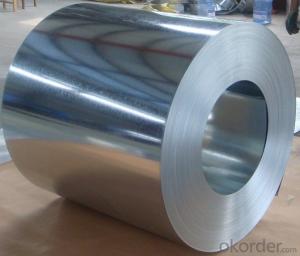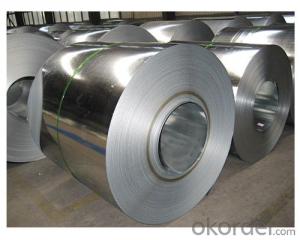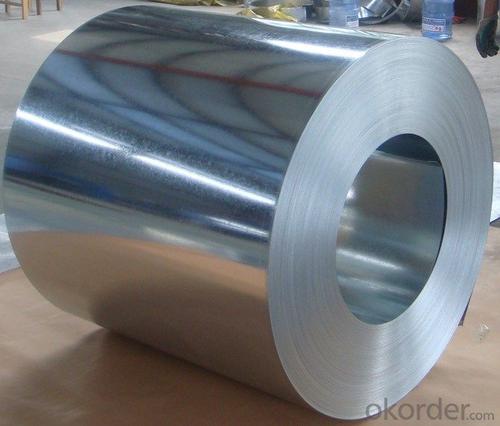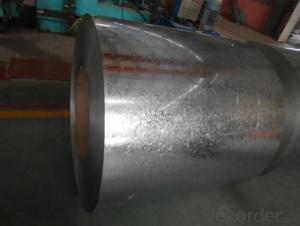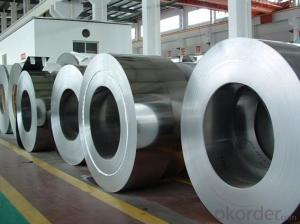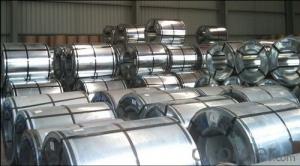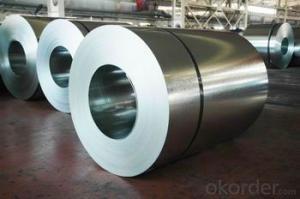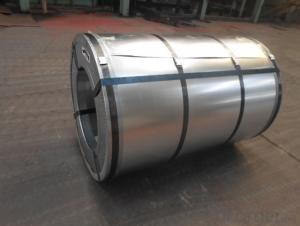Galvanized Steel Sheet in Ciols with Prime Quality Best Seller
- Loading Port:
- Shanghai
- Payment Terms:
- TT OR LC
- Min Order Qty:
- 100 m.t.
- Supply Capability:
- 10000 m.t./month
OKorder Service Pledge
OKorder Financial Service
You Might Also Like
1.Structure of Galvanized Steel Coil Description:
Hot-dip galvanized steel coils are available with a pure zinc coating through the hot-dip galvanizing process. It offers the economy,
2.Main Features of the Galvanized Steel Coil:
• Good formability
•ability
visual effect
• Base material for countless outdoor and industrial applications
Zinc coating :40-180g( as required)
Coil id:508mm/610mm
Coil weight: 4-10 MT(as required)
Surface: regular/mini/zero spangle, chromated, skin pass, dry etc.
5.FAQ of Galvanized Steel Coil
We have organized several common questions for our clients,may help you sincerely:
1.How to guarantee the quality of the products?
We have established the international advanced quality management system,every link from raw material to final product we have strict quality test;
• High corrosion resistance
• High strength
3.Galvanized Steel Coil Images
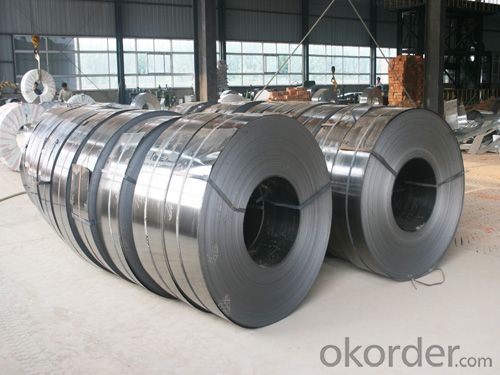
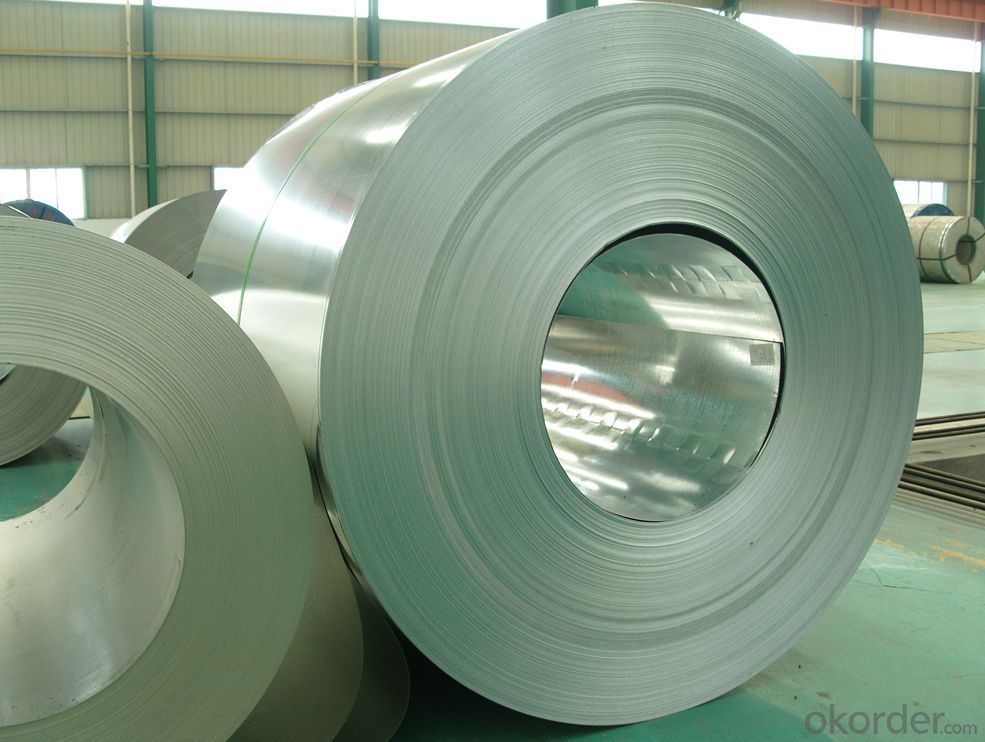
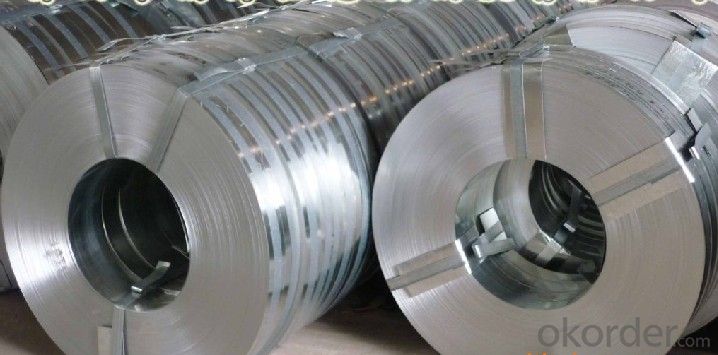
4.Galvanized Stee:914-1250mm(914mm, 1215mm,1250mm,1000mm the most common) Grade : SGCD,SGCH, Q195,DX51D Operate Standard: ASTM A653M-04/JIS G3302/DIN EN10143l Coil Specification
Width/GBT 2518-2008
- Q: What are the different methods of tension leveling for steel coils?
- There are several methods of tension leveling for steel coils, including roller leveling, stretcher leveling, and temper leveling. In roller leveling, the coil passes through a series of rollers that apply pressure to remove the internal stresses and flatten the material. Stretcher leveling involves stretching the coil beyond its yield point to remove the unevenness and then allowing it to spring back to a flat state. Temper leveling uses heat treatment to relieve the internal stresses and bring the coil to a flat condition. These methods provide different ways to achieve a level and flat surface for steel coils.
- Q: What is stainless steel coil used for?
- Stainless steel coil is commonly used in various industries for manufacturing a wide range of products such as appliances, automotive parts, cookware, construction materials, and even surgical instruments. Its corrosion-resistant properties and durability make it an ideal material for these applications.
- Q: Molten steel changes to solid steel at its __________ point. Could you please fill in the blank? Thank you so much, it is greatly appreciated. I have been looking for the answer to this question for a long time, but I never understand what the websites are trying to say because I don't have that big of a vocabulary and don't know what they mean. I've seen things saying steel boiling point, steel melting point, and steel freezing point. I don't know what any of those mean, and they might be the answer. Please help me. Thank you.
- just like a melting point of ice and the boiling point of water, there are different points where something is converted into another form. such as icewatersteam. it's always the same thing and it's a physical change, but just in a different form. molten steel changes to solid steel at it's freezing point. or solid point. i'm not sure how you would word that. but it would not be melting or boiling point. hope that helped.
- Q: i was thinking like getting a a steel building for 2 or 3 stall does anyone know how much that would cost? Have anyone used steel building how do you like them etc
- a great style of human beings are putting up those steel homes made by making use of agencies like Cleary or Morton because of the fact they are greater fee effective. yet in my opinion, i don't think of they greater wholesome horses all right. They dent very relatively, all the horse has to do is lean against it somewhat. additionally they provide no insulation so as that they are like little ovens interior the summertime and are fairly chilly interior the wintry climate. in case you're able to have adequate money it, i might flow with a competent previous formed timber barn.
- Q: Are steel coils used in the aerospace industry?
- Yes, steel coils are used in the aerospace industry. They are often utilized in the manufacturing and assembly of various aircraft components such as engines, frames, and landing gears. Steel coils provide strength, durability, and resistance to high temperatures, making them suitable for aerospace applications.
- Q: Are steel pokemon weak against any attacks? If so, what types? (like water, grass, etc.)
- Fire, Ground, and Fighting. 2 of the most common moves in the game now (Close Combat and Earthquake) will completely bone steel types.
- Q: How do steel coils contribute to energy efficiency in transportation?
- Steel coils contribute to energy efficiency in transportation in several ways. Firstly, steel coils are lightweight and have a high strength-to-weight ratio. This means that less steel material is required to carry the same load compared to other materials, such as wood or concrete. As a result, the overall weight of the transport vehicle is reduced, which leads to lower fuel consumption and emissions. Secondly, steel coils are highly durable and can withstand harsh conditions during transportation. They have excellent resistance to corrosion, impact, and fatigue, ensuring a longer lifespan for the transport vehicle. This durability reduces the need for frequent repairs or replacements, resulting in reduced energy consumption and material waste. Furthermore, steel coils are easy to handle and transport. They can be easily loaded and unloaded from trucks, trains, or ships due to their compact and standardized size. This efficiency in handling reduces the time and energy required for loading and unloading operations, thereby increasing overall transportation efficiency. Additionally, steel coils can be efficiently stacked and stored, maximizing the use of available space in transport vehicles. This reduces the number of trips required to transport the same amount of goods, resulting in less energy consumption and lower transportation costs. Lastly, steel is a highly recyclable material. At the end of their life cycle, steel coils can be easily recycled and used to produce new steel products. This reduces the demand for raw materials and the energy required for manufacturing new products, contributing to overall energy efficiency in transportation. In conclusion, steel coils contribute to energy efficiency in transportation through their lightweight, durable, easy-to-handle, and recyclable nature. These characteristics result in reduced fuel consumption, lower emissions, decreased maintenance needs, efficient use of space, and reduced material waste, all leading to a more sustainable and energy-efficient transportation system.
- Q: Can steel coils be coated with polymer?
- Yes, steel coils can be coated with polymer.
- Q: How are steel coils protected against corrosion?
- Steel coils are protected against corrosion through various methods such as applying protective coatings, galvanizing, or using corrosion inhibitors. These measures help to create a barrier between the steel surface and the surrounding environment, preventing the onset of corrosion and extending the lifespan of the coils.
- Q: What is the thickness range of steel coils?
- The thickness range of steel coils can vary depending on the specific application and industry requirements. However, generally, the thickness range of steel coils can range from as thin as 0.005 inches (0.13 mm) to as thick as 0.5 inches (12.7 mm) or even more.
Send your message to us
Galvanized Steel Sheet in Ciols with Prime Quality Best Seller
- Loading Port:
- Shanghai
- Payment Terms:
- TT OR LC
- Min Order Qty:
- 100 m.t.
- Supply Capability:
- 10000 m.t./month
OKorder Service Pledge
OKorder Financial Service
Similar products
Hot products
Hot Searches
Related keywords
